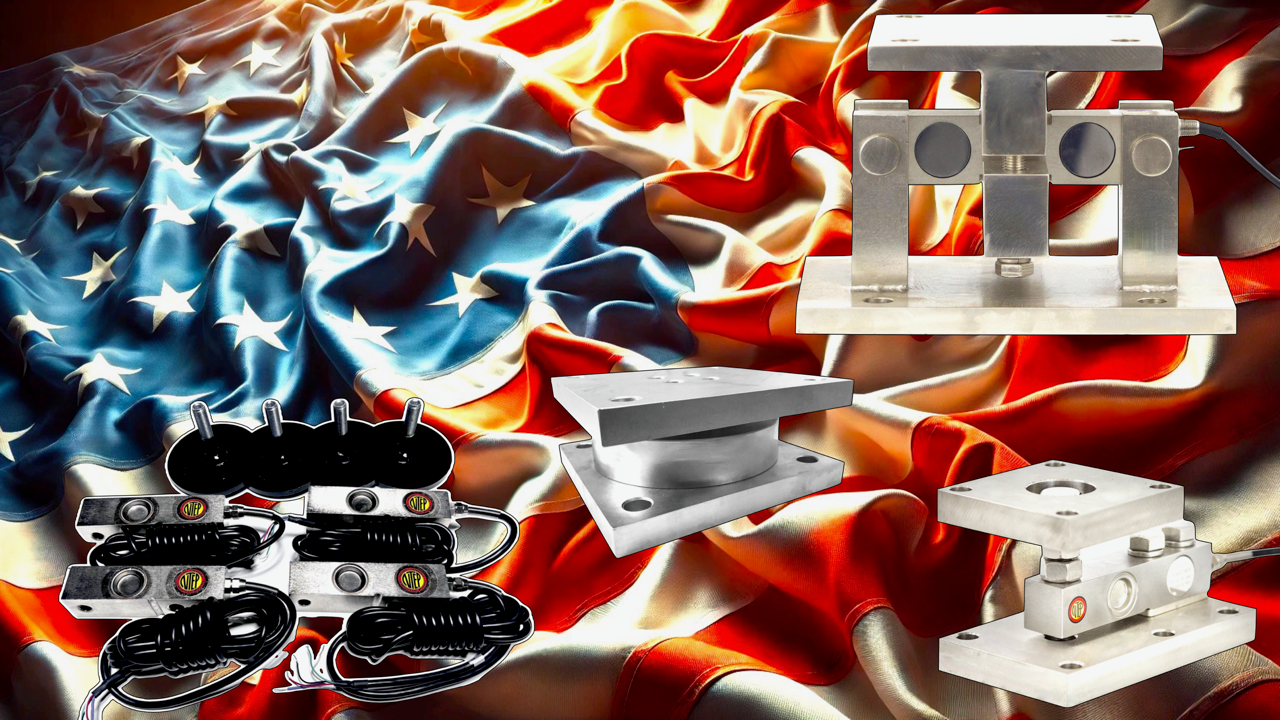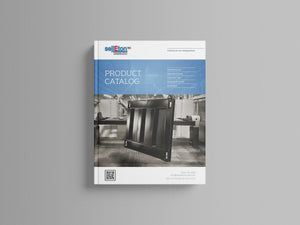
Load Cell Scale Technology: Advancing Accuracy in Weighing Systems
Load cell scales are vital tools that convert mechanical force into precise weight data. They are used in industries for quality control and accurate measurement. This article will explain how load cell scales work and their various applications in different sectors, showcasing the importance of the load cell scale in modern technology.
Key Takeaways
- Load cell scales convert mechanical forces into electrical signals for precise weight measurement, essential in various industries such as manufacturing and healthcare.
- Different types of load cells, including strain gauge, hydraulic, and pneumatic, are designed for specific applications, offering tailored solutions for accurate weighing in diverse environments.
- Regular maintenance and calibration of load cell scales are crucial for preserving accuracy and reliability, with routine checks and cleanings helping to ensure operational longevity.
Understanding Load Cell Scales
Load cells are essential components of digital scales, acting as transducers that change force into an electrical signal. The process begins when a load is placed on the cell, causing it to deform subtly. This deformation’s extent is then measured and used to ascertain the weight in question. Such bending affects the cell’s electrical resistance and facilitates precision in measuring varying weights through its conversion capability from physical pressure into electronic signals for diverse purposes. Load cells designed with superior quality materials and technology provide exceptionally accurate readings critical for sectors like manufacturing, agriculture, and scientific research.
In industries such as transportation, production, and healthcare, where meticulous weight measurements are indispensable, load cell scales become vital tools. Their role extends significantly within heavy industry settings by offering high-precision evaluations crucial for consistent process oversight—thereby ensuring accuracy during operations execution. These scales adeptly transform mechanical forces exerted on them into trustworthy numerical data which Advances operational efficiency while aiding adherence to industry standards across various professional domains.
Types of Load Cells for Accurate Weighing
Choosing the appropriate load cell scale necessitates a thorough assessment of particular application needs, factoring in both the desired capacity and prevailing environmental conditions. Load cells are available in several distinct forms, each constructed to deliver specialized attributes that contribute to precise and reliable weighing outcomes.
Among these variants are strain gauge load cells, hydraulic load cells, pneumatic load cells, along with various other type load cell types. Each category is optimized for disparate applications, offering custom solutions designed to meet unique operational demands.
Strain Gauge Load Cells
Strain gauge load cells, widely employed in the weighing industry for their proficiency in measuring weight, operate by gauging the deformation of a cell caused by applied load through strain gauges that detect even minute changes. Their resilience and high performance make them suitable for demanding settings where exactness and dependability are imperative.
These types of load cells serve a vast array of functions ranging from small-scale laboratory measurements to large industrial scales due to their sturdy build which can endure tough environments without compromising precision. The consistent accuracy and reliability offered by these strain gauge-equipped cells have cemented their reputation as a preferred option within the realm of weight measurement.
Hydraulic Load Cells
Hydraulic load cells are recognized for their exceptional accuracy and dependability, which makes them a go-to option for diverse uses. Utilizing hydraulic pressure to gauge weight, these cells can withstand significant loads without succumbing to deformation. Their configuration reduces the impact of external factors, enhancing their precision.
In environments fraught with hazards such as oil rigs, hydraulic load cells demonstrate superior performance by accurately gauging hefty weights safely. They maintain consistent functionality in situations that might impair conventional electronic load cells. Thus, they stand out as an optimal solution for rigorous applications where both durability and meticulousness are critical.
Pneumatic Load Cells
Using air pressure to function, pneumatic load cells are crafted for use in environments that may contain explosive materials or gases. They offer an explosion-proof option, ensuring operational safety and delivering reliable performance when dealing with hazardous conditions.
Digital Load Cells
Digital load cells employ cutting-edge technology to enhance both precision and effectiveness within weighing systems. Take, for instance, the SCBD series SmartCell® digital load cells. They are designed with self-calibrating technology which achieves linear calibration up to their maximum capacity. As a result, these cells provide accurate readings while streamlining the calibration process.
The DC series of digital load cells come integrated with iSite remote diagnostic monitoring software that facilitates convenient monitoring and problem-solving capabilities. Their built-in circuit design negates the necessity for an external junction box, thereby making installation simpler and boosting system dependability.
Given such advancements, it is clear why digital load cells have become increasingly popular in contemporary weighing applications.
Key Features of High-Quality Load Cell Scales
Load cell scales of superior quality deliver precise and reliable weight readings critical for applications where accuracy is paramount. These scales are constructed from strong materials, which bolster their longevity and consistent performance. They come with environmental sealing bearing certain IP ratings that protect them against the ingress of moisture, dust, and other airborne pollutants.
These load cell scales also boast advanced technology paired with user-friendly interfaces that make them easy to operate without compromising on the accuracy of measurements.
Precision and Accuracy
Load cells enhance the precision of weight measurement processes by transforming mechanical force or pressure into an electrical signal. These cells employ cutting-edge digital technology that facilitates immediate monitoring and diagnostics for exact measurements. To preserve their accuracy, it is crucial to perform regular maintenance checks and calibrations, confirming that load cells reset to zero after unloading and consistently display the correct weight irrespective of where the load is positioned.
Calibration entails matching a sensor’s reading against a known standard, followed by adjustments if necessary. Ensuring consistent calibration at set intervals safeguards the precision and dependability of load cell systems, which is particularly important in applications requiring high levels of accuracy. Calibration Requires placing calibrated weights on the load cell and tuning its output to align with anticipated values.
Within these cells are strain gauges that detect subtle shifts in weight, thereby elevating measurement fidelity further. Load cell scales play an integral role in heavy industry process control systems by enabling accurate management of various operations’ weights. As they provide reliable data with heightened precision for digital weighing tasks, such scales notably boost both efficiency and quality within industrial processing activities.
Durability and Reliability
Scales equipped with load cells are typically made from durable substances like stainless steel and premium aluminum, affording them superior strength and the ability to resist corrosion effectively. To maintain their precision and longevity, these scales necessitate consistent upkeep involving mechanical assessments as well as inspections for any signs of deterioration or rust.
To ensure precise readings, a sturdy frame for mounting is essential along with an even and uncontaminated area for installation to avoid irregular load distribution. It’s crucial when considering expenses in relation to functionality that one scrutinizes both the composition and configuration of load cells to confirm their suitability for the intended use demands.
Environmental Protection
Load cells with environmental sealing, like those rated at IP67, are shielded from dust and water immersion. This is essential for sustaining their precision when used in extreme conditions. The robustness of AG load cells allows them to function reliably amidst elements such as rain, snowfall, dirt particles, and sludge — making them ideal for outdoor use.
Encased components and wiring define the TSP light single point load cells, offering defense against humidity intrusion which contributes to consistent performance even in demanding settings. Cardinal Scale’s load cell technology employs unique sealing substances along with waterproof techniques including an internal potting process that helps block the ingress of moisture.
With these protective measures in place, the range of environments where load cells can be effectively utilized expands significantly. They’re capable not only in hostile weather but also within abrasive or corrosive surroundings—broadening their use across various industrial domains while safeguarding critical points within each cell.
Applications of Load Cell Scales Across Industries
Load cells play a crucial role in multiple sectors such as packaging, automotive, and agriculture by providing accurate weight measurements that are vital for adherence to compliance standards and the enhancement of operational efficiency. These devices offer uniform and trustworthy readings which are fundamental in logistics and commerce activities due to their impact on cost determination and safety aspects. In settings like these, truck scales become particularly indispensable.
Load cells contribute significantly to the automation of weighing procedures, fostering better oversight and quality control within production streams. This is especially true when they are incorporated into industrial weighing systems.
Laboratory Research
Load cells play a vital role in laboratory environments, particularly where applications demand high levels of precision like chemical analysis and dosage. They provide consistent measurement solutions that bolster the accuracy and trustworthiness of experimental results, which is essential for experiments and research activities.
Heavy Industrial Applications
Within the realms of manufacturing and logistics, beam load cells are required to adhere to strict commercial trade standards. For example, NTEP-certified load cells are officially sanctioned for commerce. Shear beam load cell technology is extensively utilized in scenarios such as low-profile platform scales and process weighing systems due to their high level of precision. Similarly, CenterPoint load cell kits serve a crucial role in optimizing operational efficiency through their application in activities like mixing, blending, and managing inventories within manufacturing processes.
In the field of logistics, the implementation of these cells significantly enhances inventory management by ensuring accurate weight measurements during both storage phases and transit periods, which streamlines overall workflow operations. SCA provides an array of load cell models with substantial weight capacities that span from 120,000 lb (54,430 kg) up to 200,000 lb (90,720 kg), accommodating a variety of intense industrial demands.
Cardinal’s selection includes robust double-ended shear beam load cells designed with two specific capacity options: either 50k or 75k lbs., thus offering solutions tailored for different scale requirements across various industries.
Agricultural Weighing
Load cells are essential components in the agricultural industry, as they enable farmers to precisely weigh their produce and animals, facilitating effective inventory control. These scales with load cells are instrumental for tracking livestock weight fluctuations and evaluating harvest quantities, thereby enhancing overall farm management strategies.
Within farming practices, it is common to employ load cells within weighing systems to determine the mass of various items such as animal feed, fertilizers, and crops after harvesting. By guaranteeing precise measurement of these products’ weight through the use of load cell technology, agricultural processes can be conducted with greater efficiency and accuracy.
Choosing the Right Load Cell Scale for Your Needs
Choosing an appropriate load cell scale is essential for obtaining precise and accurate weight measurements across a range of uses. This selection process requires consideration of particular demands such as the capacities for handling weight, ambient conditions, and selecting a type of load cell housing that aligns optimally with the intended application.
By reaching out to SellEton’s specialists, clients can secure tailored advice ensuring their load cell kit is well-suited to their machinery needs.
Assessing Weight Capacities
Load cells are manufactured to handle a diverse range of loads, offering capacities from just a few kilograms up to hundreds of tons tailored for specific uses. When it comes to hydraulic load cells, they typically offer weight detection capabilities starting at 2,500 lbs and can go all the way up to 200,000 lbs. On the other hand, single point load cells have an upper limit of around 200 kg making them well-suited for mid-size scales and weighing platforms.
The selection process for a suitable scale that incorporates a load cell with the proper capacity is vital in order to fulfill distinct measurement demands across various contexts. It is important whether you’re using platform load cells which often accommodate weights close to 150 kg or opting for aluminum tension type load cells that measure within a spectrum ranging from as little as 50 lb up to larger measures like 1,000 lb.
It’s imperative when determining which scale and its corresponding weight capacity will best fit your application needs that you consider what is necessary not only in terms of function but also measurement precision. This ensures your chosen device has adequate responsiveness when it comes time for accurate weight assessment in varied applications.
Considering Load Cell Housing
It is essential for the load cell housing to be appropriate for its operating conditions, taking into account critical aspects such as protection against moisture and dust. Proper sealing and protective elements within the housing of a load cell are crucial in preventing environmental pollutants from impacting its function.
By carefully selecting a load cell housing that suits the operational environment, you can greatly enhance the performance of your scale.
Evaluating Cost vs. Performance
When making a decision between affordability and performance regarding load cells, consider the long-term effects on operational productivity. Opting for lower initial costs might lead to increased inaccuracies and elevated maintenance costs down the line. Conversely, investing in superior quality load cells can minimize both downtime and maintenance needs, leading to a more dependable investment return over an extended period.
The price of load cells is influenced by various elements such as their capacity, level of accuracy, and advanced features they may possess. These aspects not only impact the cost but also determine how suitable they are for particular applications.
To select an appropriate load cell that aligns with financial constraints while maintaining essential functionality involves evaluating crucial characteristics against budgetary limits. This includes considering environmental factors and compliance standards required for successful operation. Thoroughly comparing project demands with available options ensures the selection of a load cell that satisfies technical prerequisites without exceeding fiscal boundaries.
Maintenance and Calibration of Load Cell Scales
Ensuring the durability and precision of load cell scales hinges on consistent upkeep and calibration, which helps to avert costly fixes or the need for new equipment. It’s important to keep up with routine cleaning, checking for any signs of damage, and being vigilant about potential shifts in performance.
To maintain the accuracy of measurements over time and prevent scale readings from becoming unreliable, regular calibration is vital. This process typically involves using certified reference weights during standard calibration routines that should be carried out consistently to achieve optimal outcomes.
Regular Maintenance Practices
Consistently examining load cell scales for signs of deterioration guarantees that each part operates as intended. Recording any inconsistencies found during these examinations can assist in monitoring possible problems as they develop over time. The periodic cleansing of the load cell scales to eliminate dust and various impurities is essential, as it has a notable impact on their functionality.
It’s equally vital to establish a proactive maintenance plan which includes the timely replacement of key components before they malfunction. Regularly conducting calibration tests ensures that the weighing accuracy is preserved, following guidelines provided by the manufacturer.
Calibration Procedures
Maintaining precise weight measurements on load cell scales requires consistent calibration to ensure their accuracy. Over time, this regular calibration process helps to eliminate variations in the readings of weight.
The process typically includes incrementally adding standard weights into a vessel during deadweight calibration until the scale reaches its full capacity. Incorporating sophisticated equipment or software while calibrating can make this procedure more efficient and improve the precision of the scale.
Summary
In summary, scales that utilize load cells are crucial for obtaining precise and accurate measurements in numerous industrial settings. Whether it’s conducting laboratory research or managing heavy-duty industrial applications, the significance of these cells in maintaining precision is immense. A thorough comprehension of the various load cell types, their distinctive characteristics, and their tailored uses can empower companies to refine their weighing practices. To maintain a load cell’s precision over time, consistent upkeep and calibration are vital—this ensures both its long-term accuracy and durability. Henceforth, committing to superior quality load cell technology constitutes a tactical investment aimed at improving exactitude within weighing systems.
Frequently Asked Questions
How can customers ensure their load cell kit matches their equipment?
Customers should consult SellEton’s team for expert recommendations to ensure their load cell kit is compatible with their equipment. This proactive approach will guarantee proper matching and optimal performance.
How can customers contact SellEton?
Customers can reach SellEton by phone at (844)-735-5386 or through email at info@selletonscales.com.
What are load cells typically used for?
Load cells are typically utilized in platform weighing scales for accurate measurement of weight. Their precision makes them essential in various weighing applications.
What advantages do load cell scales provide?
Load cell scales offer enhanced accuracy, reliability, and precision in digital weighing, making them an excellent choice for various applications. Their consistent performance ensures trustworthy results in measurement tasks.
What determines the size and types of load cells used?
The size and types of load cells are determined by the weight and dimensions of the object being measured. It is essential to match the load cell specifications to the intended application for accurate results.

